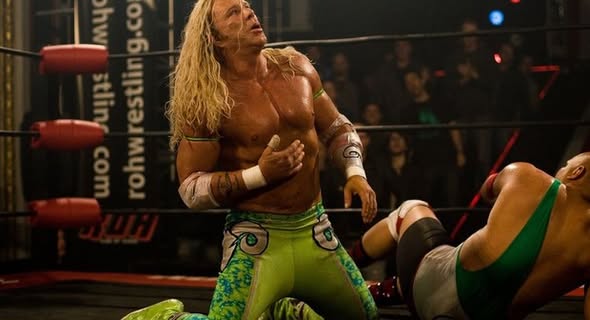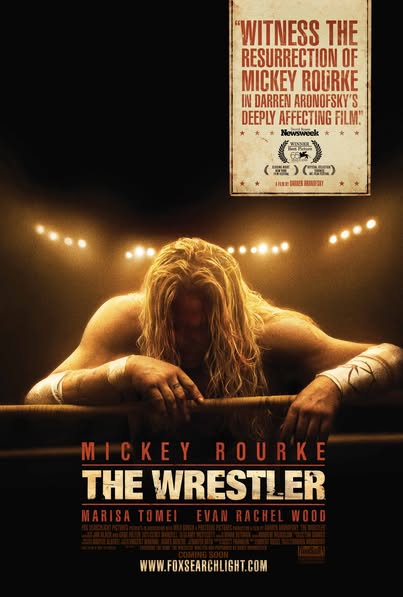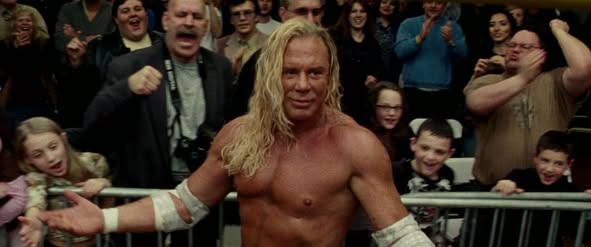The Wrestler (2008)

The Wrestler (2008) is a poignant and raw exploration of the life of an aging professional wrestler, capturing the struggles of identity, resilience, and the pursuit of redemption. Directed by Darren Aronofsky, the film stars Mickey Rourke in a career-defining role that earned him widespread acclaim and a nomination for the Academy Award for Best Actor. Through its heartfelt storytelling and realistic portrayal of the wrestling world, The Wrestler offers a compelling commentary on fame, personal sacrifice, and the quest for meaning in life.
The narrative centers around Randy “The Ram” Robinson, a once-famous wrestler who is now grappling with the physical and emotional toll of a life spent in the ring. As he navigates the challenges of aging and the fading glory of his past, Randy’s character embodies the struggles faced by many performers in the world of professional wrestling. The film opens with a striking contrast between the electrifying atmosphere of the wrestling arena and the stark reality of Randy’s everyday life, showcasing how he clings to his past while facing the consequences of his choices.

Randy’s relationships are central to the film, particularly his bond with his estranged daughter, Stephanie, played by Evan Rachel Wood. Their interactions reveal the emotional scars left by his dedication to wrestling, as he attempts to reconnect with her while still being haunted by his past. This father-daughter dynamic adds an emotional depth to the story, highlighting themes of regret and the longing for acceptance.
Furthermore, Randy’s relationship with a stripper named Cassidy, portrayed by Marisa Tomei, serves as a poignant reflection of his search for companionship and validation. Their connection is fragile yet genuine, illustrating the loneliness that often accompanies a life of performance and the desire for human connection. Cassidy’s struggles in her own life mirror Randy’s, creating a sense of shared vulnerability that enriches both characters.

The film’s cinematography, characterized by its gritty realism, immerses viewers in the world of independent wrestling. Aronofsky employs a documentary-style approach, capturing the physicality of the performances and the emotional stakes involved. The wrestling scenes are intense and visceral, showcasing the brutal reality of the sport while emphasizing the dedication and passion of the performers. This authenticity adds to the film’s emotional weight, inviting viewers to empathize with Randy’s journey.
Mickey Rourke’s performance is nothing short of remarkable. He fully embodies the character of Randy, conveying a deep sense of vulnerability and strength. Rourke’s physical transformation for the role reflects the toll that wrestling has taken on his body, adding a layer of authenticity to his portrayal. His nuanced performance captures the complexities of a man who is both a fighter in the ring and a broken individual seeking redemption in his personal life.

The Wrestler also features a haunting score by Clint Mansell, which enhances the film’s emotional resonance. The music complements the narrative, underscoring the themes of loss and longing that permeate Randy’s journey. The combination of visuals and score creates a powerful atmosphere that lingers long after the film concludes.
In conclusion, The Wrestler is a deeply affecting film that transcends the boundaries of the sports genre to explore profound themes of identity, sacrifice, and the quest for redemption. Through Darren Aronofsky’s sensitive direction and Mickey Rourke’s outstanding performance, the film captures the essence of what it means to pursue one’s passion while grappling with the consequences of that dedication. The Wrestler serves as a poignant reminder of the fragility of life and the enduring human spirit, making it a significant and memorable entry in contemporary cinema.











